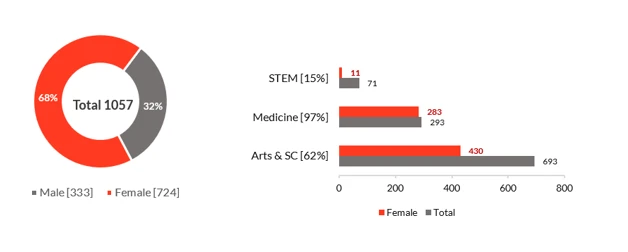ÃÜÌÒÊÓƵ continues to demonstrate steady progress in advancing gender balance in graduation rates, reflecting the positive impact of its support mechanisms. In 2024, the total number of graduates rose to 1,057, with 724 female graduates (representing 68% of the cohort).
Discipline-Specific Success (Closing the Gap):
Analysis shows significant progress toward gender balance, particularly in fields targeted for intervention:
STEM: Female participation in the critically underrepresented STEM domain rose significantly from 13% in 2023 to 15% in 2024, marking solid progress in addressing gender imbalance in this traditionally male-dominated field.
Law and Business: Law achieved a perfectly balanced gender ratio of 50% in 2024. In Business, the proportion of women increased from around 50% to 58%.
High Retention: Health and Medicine remained highly female-dominated, with 97% female graduates (up from 94%), and Teaching maintained strong female representation at 85%.
Schemes Driving Success and Addressing Disparity
These achievements reflect the clear effectiveness of targeted initiatives designed to raise awareness, build capacity, and ensure women successfully persist to graduation by addressing financial, professional, and academic barriers.
Targeted Mentoring and Capacity Building (Non-Financial Support)
These programs provide essential professional guidance and soft skills that boost confidence and persistence among female students, directly supporting their ability to complete challenging programs:
The Centre for Innovation and Entrepreneurship Development (CIED) maintains a specific wing for mentoring women in the STEM domain. This mentorship is conducted in collaboration with academic units, industry experts, and associations such as Women in Tech Maldives.
"Women in Law" Panel: Collaboration with the Maldives Bar Council featured prominent female legal leaders (Supreme Court Justice, JSC President, First Female Lawyer) to inspire and mentor students.
Faculty Leadership: Female faculty, such as Uza. Asna Ahmed (Dean) and Amish Abdullah (Lecturer), delivered keynote speeches and chaired sessions at the International Conference on Women's Rights, showcasing female academic leadership to students.
EveryWoman Campaign Sessions: Partnership with Moms Aid and local councils to conduct parenting ("Tharubiyyathu") and Legal Aid sessions, reducing external social barriers that commonly interrupt women's studies.

